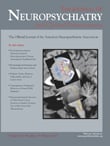Neuropsychological Findings in a Case of Neurosarcoidosis
To the Editor: Sarcoidosis is a chronic inflammatory disorder which typically affects the lungs but may impinge on the nervous system. Neurosarcoidosis develops in approximately 5% to 15% of cases, often presenting with facial muscle weakness, headache, and optic and auditory neuritis. The cognitive effects of neurosarcoidosis are poorly understood, although there are reports of delirium, dementia, and psychosis in some patients. 1 , 2 Here we present a patient with confirmed neurosarcoidosis who completed comprehensive neuropsychological testing following complaints of cognitive disturbance.
Case Report
The patient is a right-handed 39-year-old African-American woman who presented to the outpatient neuropsychology clinic with chief complaints of memory problems and vision loss. She reported a history of asthma attacks beginning in her early twenties, which 10 years later suddenly became more frequent. Chest x-ray and biopsy confirmed sarcoidosis in her right lung. Treatment with 60 mg of prednisone was initiated for 1 year with minimal improvement in asthma attacks. She was asymptomatic with regard to sarcoidosis for several years. Four months ago she presented to the emergency department with complete vision loss in her right eye and right frontal headache. Neurodiagnostic testing revealed optic neuritis, which was treated with high-dose steroids. She was referred for neuropsychological testing to assess impacts of the disease on the CNS because of complaints of episodic memory loss and dysnomia.
Upon examination, the patient reported 60% recovery of vision. Neuropsychological testing revealed overall low intellectual function, but within the average range and consistent with premorbid estimates. Significant inefficiencies were demonstrated on tests of rapid information processing and executive function, primarily with regard to conceptualization and abstraction abilities. Auditory (verbal) and visual memory were poor, although retention of previously acquired information, however minimal, was intact. Of note, she encountered considerable difficulty in discriminating between novel information and items previously presented on memory testing, suggesting difficulties with source memory. Mildly inefficient expressive language abilities including verbal fluency and confrontation naming likely reflect cultural and academic factors. Sensory-perceptual examination revealed loss in the upper right visual field of the right eye. Reports of irritability and depression were attributed to steroid treatment.
Discussion
These findings converge with a previous report of attention and executive function deficits in a patient with neurosarcoidosis. 3 Whereas the effects of sarcoidosis on the brain are not understood, evaluation of the current patient certainly indicates disruption of frontal systems supporting higher-order cognitive functions, complex attentional abilities, and possibly source memory attributions. In contrast with previous case reports of patients with neurosarcoidosis who presented with frank disturbance of mental status (e.g., delirium, psychosis), the present case reveals subtle higher-order cognitive inefficiencies likely associated with disruptive effects of sarcoidosis on frontal systems. This case highlights the impact of systemic conditions on cognitive function and the relevance of sarcoidosis to efficient cerebral function. Comprehensive neuropsychological testing may be considered for patients with sarcoidosis who present with cognitive complaints.
1. John S, Ovsiew F: Schizophrenia vs. neurosarcoidosis in a young male. Psychosomatics 1996; 37:166–168Google Scholar
2. Friedman SH, Gould DJ: Neurosarcoidosis presenting as psychosis and dementia: a case report. Int J Psychiatry Med 2002; 32:401–403Google Scholar
3. Pruter C, Kunert HJ, Hoff P: ICD-10 mild cognitive disorder following meningitis due to neurosarcoidosis. Psychopathology 2001; 34:326–327Google Scholar



